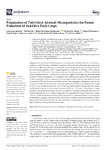Preparation of Poly(vinyl Alcohol) Microparticles for Freeze Protection of Sensitive Fruit Crops

Use this link to cite
http://hdl.handle.net/2183/31163Collections
- Investigación (EPEF) [590]
Metadata
Show full item recordTitle
Preparation of Poly(vinyl Alcohol) Microparticles for Freeze Protection of Sensitive Fruit CropsAuthor(s)
Date
2022Citation
Sabando, C.; Ide, W.; Rodríguez-Llamazares, S.; Bastías, R.M.; Valenzuela, M.; Rojas, C.; Castaño, J.; Pettinelli, N.; Bouza, R.; Müller, N. Preparation of Poly(vinyl Alcohol) Microparticles for Freeze Protection of Sensitive Fruit Crops. Polymers 2022, 14, 2452. https://doi.org/10.3390/polym14122452
Abstract
[Abstract] Poly(vinyl alcohol) (PVA) displays ice recrystallization inhibition (IRI) properties as many antifreeze proteins found in cold tolerant organisms. The molecular architecture and composition (molecular weight and distribution of pendant OH and acetate groups) have been studied to improve the antifreezing properties of PVA, suggesting that the molecular architecture of PVA plays an important role in IRI activity. The present work deals with the preparation of PVA microparticles using an alkaline treatment. The effect of PVA molecular weight on the morphology and antifreezeing properties of PVA microparticles was investigated. The antifreezeing property of PVA microparticles on the susceptibility of flower bud tissues to freeze damage was also evaluated. The alkaline treatment of an aqueous PVA solution produced stable polymer chain aggregates with spherical shapes. The average size of the PVA microparticles increased significantly with the increasing molecular weight of the PVA macromolecule precursor. The PVA microparticles inhibited the growth of ice crystals and blocked ice growth at concentrations as low as 0.01 % w/v. The effect of impeding ice crystal growth by preventing the joining of adjacent ice crystals is attributed to the larger size of the PVA particles adsorbed on the ice surface compared to the aggregated PVA macromolecules in saline solution. The thermal hysteresis activity of PVA macromolecules and microparticles was not detected by differential scanning calorimetry analysis. The PVA microparticles reduced the incidence of freeze injuries in flower bud tissues by 55% and their application, considering the low toxicity of PVA, has a high potential for freeze protection in fruit crops.
Keywords
PVA microparticles
Ice recrystallization inhibition
Freeze injury
Cherry plants
Ice recrystallization inhibition
Freeze injury
Cherry plants
Editor version
Rights
Attribution (CC BY) license
ISSN
2073-4360






